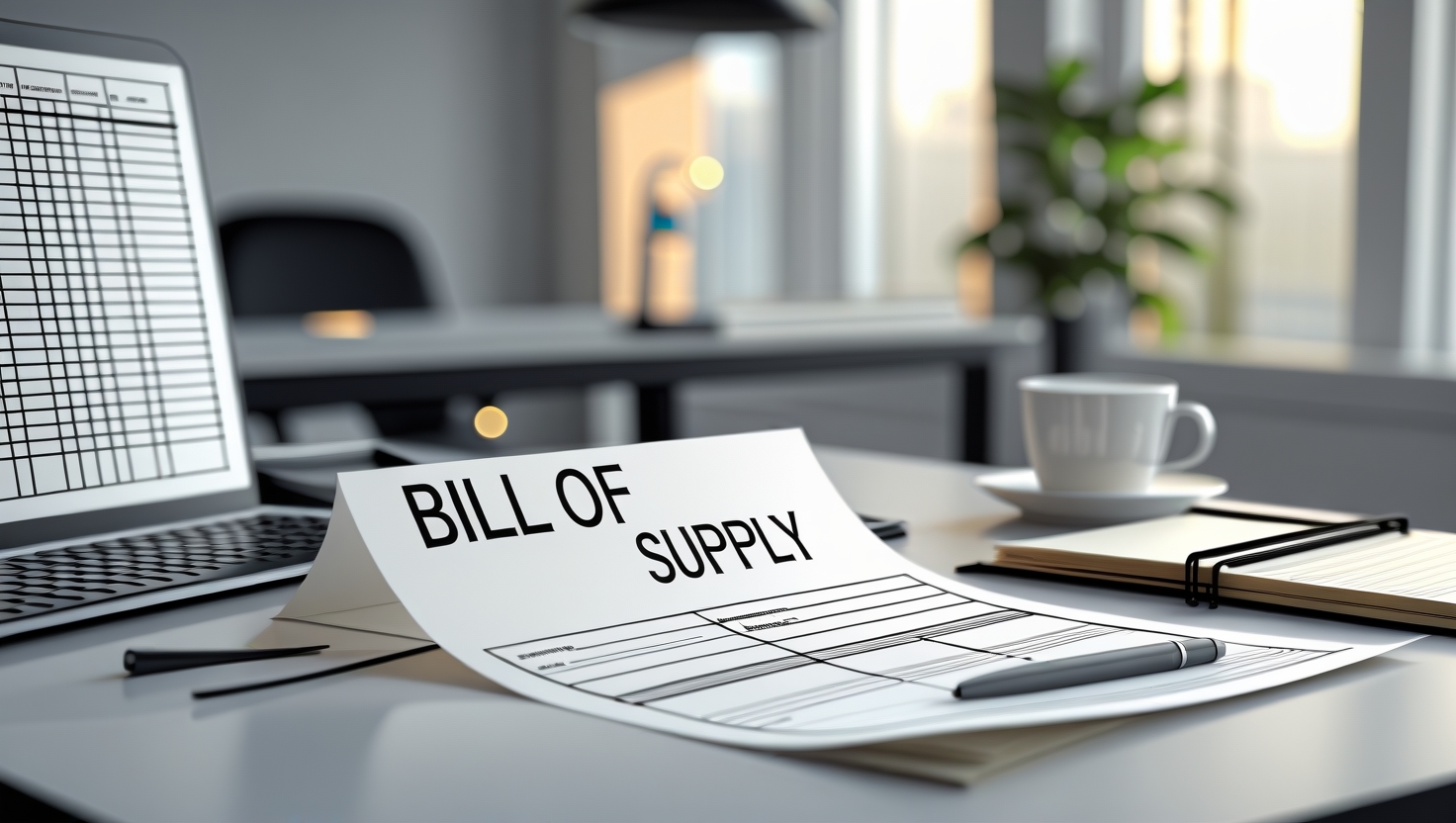
What Is a Bill of Supply? #
A Bill of Supply is a document businesses issue when selling goods or services that are exempt from GST or when registered under the GST composition scheme. Unlike a tax invoice, a Bill of Supply does not include GST charges, as these transactions are not taxable.
Though simple, it is an important document that helps maintain clear records, ensures legal compliance, and enhances professionalism.
Key Features of a Bill of Supply #
1. No GST Charges
The Bill of Supply excludes GST as it applies only to exempt goods or services or businesses under the composition scheme.
2. Supplier Information
It must include the name, address, and GSTIN (if applicable) of the seller.
3. Buyer Details
Basic details like the buyer’s name and address should be included.
4. Unique Serial Number
Each Supply invoice requires a distinct serial number for tracking.
5. Date of Issue
The document should clearly display the date it was issued.
6. Description of Goods or Services
Details such as product name, quantity, and price must be provided.
7. For Exempt Goods or Composition Dealers Only
This document applies exclusively to GST-exempt goods or services and businesses under the composition scheme.
Why Is a Bill of Supply Important for Small Businesses? #
For small businesses, especially those dealing with GST-exempt transactions or operating under the composition scheme, a Bill of Supply offers several advantages:
1.Simplicity
The document is straightforward, as it doesn’t involve GST calculations. This saves time and effort.
2. Ease of Compliance
It ensures businesses remain compliant with GST rules without the complexity of tax invoices.
3. Cost-Effective
Using a Bill of Supply eliminates the need for expensive accounting services, saving money for other business needs.
4. Builds Trust
Clear and professional billing fosters customer trust, showing that your business is organized and reliable.
Advantages of Using a Bill of Supply #
1. Simplifies Your Work
The simple format of a supply invoice makes it easy to issue. This gives you more time to grow your business.
2. Supports Business Growth
By minimizing administrative burdens, the Bill of Supply helps small businesses allocate more resources to operations and customer acquisition.
3. Reduces Costs
Small businesses can save on bookkeeping expenses since this document doesn’t require complex tax calculations.
4. Ensures Compliance
Issuing the correct document keeps your business aligned with GST laws, reducing the risk of penalties.
When Should You Use a Bill of Supply? #
Businesses need a Bill of Supply in the following cases:
- For GST-Exempt Goods or Services: For example, a grocery store selling tax-free items like fresh produce should use a Bill of Supply.
- Under the GST Composition Scheme: Businesses registered under this scheme must issue Bills of Supply instead of tax invoices.
How to Create a Bill of Supply #
Issuing a Bill of Supply is easy if you follow these steps:
- Verify Your Eligibility: Ensure your business qualifies to issue a Bill of Supply (e.g., GST-exempt or under the composition scheme).
- Add Supplier Information: Include the name, address, and GSTIN (if applicable) of your business.
- Include Buyer Details: Mention the buyer’s name and address.
- Describe the Items: List the goods or services sold, with details like product name, quantity, and price.
- Use a Unique Serial Number: Assign a sequential number to every bill for easy tracking.
- Mention the Date: Clearly state the date the bill is issued.
- Exclude GST: Do not include any GST amounts on this document.
- Sign the Bill: Add a signature—manual or digital—to validate the document.
Avoiding Common Mistakes #
- Eligibility Errors: Ensure your business is qualified to issue a Bill of Supply. Misusing it can lead to penalties.
- Incomplete Details: Make sure every field is filled out correctly, including buyer and supplier details.
- Incorrect Format: Follow the GST rules for formatting Bills of Supply.
- Serial Number Mistakes: Maintain sequential numbering for easy record-keeping.
- Not Staying Updated: GST rules may change, so always stay informed about the latest regulations.
Use Vyapar App to Simplify Your Work #
Creating a Bill of Supply manually can be time-consuming. Digital tools like Vyapar App can streamline the process:
- Easy Templates: Pre-designed templates simplify billing.
- Auto Serial Numbers: The system automatically assigns serial numbers.
- Mobile Access: Create and manage bills from anywhere using the app.
- Organized Records: All your Bills of Supply are stored in one place for easy retrieval.
- Integrated Features: The app combines billing with financial tracking, making it a comprehensive tool.
FAQs #
1. Who needs to issue a Bill of Supply?
Businesses selling exempt goods or services or operating under the GST composition scheme.
2. Do I need a GSTIN to issue a Bill of Supply?
Not necessarily. If you’re exempt from GST, you can issue this document without a GSTIN.
3. Is a signature mandatory?
Yes, all Bills of Supply must be signed—manually or digitally.
4. What if I issue the wrong document?
Issuing a tax invoice instead of a Bill of Supply could lead to compliance issues.
Use Vyapar App to handle billing, stock & payments all in one place.
Make bills, track stock, and handle payments in one place.
